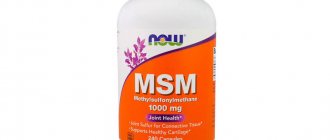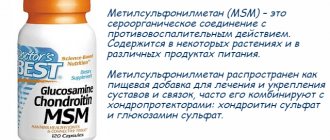What is Methylsulfonylmethane?
MSM is an organic sulfur-containing compound that is used to strengthen the immune system, reduce inflammation, and repair damaged body tissues.
Biologically active sulfur is the fourth most abundant mineral in the body and is essential for various functions. This compound is found in the human body, meat, dairy products and vegetables.
Sulfur is a mineral that is present in every cell of the body. It plays a key role in liver metabolism, the formation of keratin in skin and hair, is present in articular cartilage, and even protects the brain from aging.
The healthiest nations in the world have the highest levels of sulfur in their diets, with Icelanders, for example, having low rates of depression, obesity, diabetes and cardiovascular disease. Scientists attribute much of this achievement to the volcanoes around the island nation. These volcanoes are full of sulfur, which after the eruption settles on the soil and water. Thanks to this, both vegetables and meat products contain more minerals than usual.
Methylsulfonylmethane is an integral part of the “sulfur cycle” in the biosphere, in which sulfur is absorbed from the soil by plants and released into the atmosphere in the form of highly volatile dimethyl sulfide compounds. It is oxidized in the upper atmosphere to dimethyl sulfoxide (DMSO), which becomes an atmospheric source of MSM. DMSO and MSM return to the soil through rain and the sulfur cycle repeats.
Over the past 2 decades, agricultural production has become high-tech. Farms focus on producing high yields and deplete the soil, removing vital nutrients like sulfur. In addition, farmers use artificial fertilizers containing phosphates, the excess of which interferes with the absorption of sulfur.
Sulfur compounds and human health
Sulfur-containing amino acids are extremely important for maintaining the integrity of cellular systems. They affect the ability to produce glutathione, which is present in every cell of the body and protects DNA.
Glutathione is a key player in the organs' ability to neutralize free radicals, reactive oxygen species, and detoxify toxic compounds. Low glutathione levels create a strong susceptibility to genetic damage and the development of chronic inflammatory diseases.
Glutathione has two main states within the body: reduced glutathione (GSH) and oxidized glutathione (GSSG). Reduced glutathione is a linear tripeptide of L-glutamine, L-cysteine and sulfhydryl glycine.
The sulfhydryl group has strong electronic character. As the molecule loses electrons during oxidation, the disulfide bridge creates the GSSG form. Oxidized glutathione is converted back to GSH upon repeated electron reduction.
GSH and GSSG coefficients
GSH and GSSG levels are tightly controlled both inside and outside the cell. The ratio of GSH to GSSG in cells is often used by scientists and physicians as a measure of cellular toxicity and oxidative stress. In healthy cells and tissues, more than 90% of glutathione is in the form of GSH and less than 10% in the form of GSSG.
The higher the GSH/GSSG ratio, the healthier the cell and the lower its susceptibility to destruction and genetic mutation. The ratio of extracellular GSH to GSSG indicates the overall oxidative state of blood plasma.
Methylsulfonylmethane is capable of donating electrons to GSSG, but also promotes the formation of GSH. It has a beneficial effect on the body's ability to cope with oxidative stress, protecting intracellular organelles and components of extracellular tissues (blood vessels, intestinal mucosa and lungs), because these areas are most affected by reactive oxygen species. But that's not all the beneficial properties.
MSM sulfur contraindications and side effects
Methylsulfonylmethane is a substance of natural (plant) origin, and therefore has no side effects. The drug is non-toxic and no side effects have been recorded when taking it. At the same time, the FDA, which is the regulatory body for pharmaceutical products, has issued a certificate for this product indicating its safety. However, when taking it, it is better not to exceed the dosage recommended by the manufacturer. If you feel discomfort when taking it, drink more water. To maintain overall health, you should take at least 1500mg of MSM daily.
Pregnancy and breastfeeding are a relative contraindication to taking MSM, get your doctor's approval. Most likely there will be no contraindications for you.
How does the supplement work?
Methylsulfonylmethane provides the body with additional sulfur to create the amino acid methionine, which in turn is important for many processes in the body, such as the formation of connective tissue, absorption of nutrients for further energy production, etc.
It is a natural byproduct of dimethyl sulfoxide, so their medicinal properties are similar. DMSO is converted in the body to MSM, which stays in the body longer than DMSO with all its long-term consequences.
The diet of our ancestors contained more sulfur, namely in some animal products, vegetables and many fruits. Today, many people are deficient in these foods, hence the sulfur content in the body is low. In addition, sulfur levels in the body can drop as we age, especially if we eat unhealthy foods.
The main sources of sulfur in foods are cruciferous vegetables (broccoli, cabbage, Brussels sprouts, etc.), eggs and seafood, but the natural sulfur content of seafood is reduced when processed at high temperatures during cooking or if the food is no longer very fresh. The difference between sulfur and methylsulfonylmethane is that it is odorless and tasteless, so cooked eggs and vegetables are free of strong odors.
In humans and animals, methylsulfonylmethane is naturally found in the adrenal cortex, which regulates the response to stressors. It is also stored in the cerebrospinal fluid and is used to maintain the structure of healthy connective tissue.
This supplement speeds up wound healing and cleanses the body by improving the entry and exit of chemicals from cells. Methylsulfonylmethane essentially permeabilizes cells, releasing excess heavy metals, waste, toxins and helping to absorb nutrients and water.
This reduces inflammation, which is the root of most diseases. It also stabilizes cell membranes, improves the body's antioxidant capabilities, slows or stops the leakage of substances from damaged cells, and scavenges hydroxyl free radicals.
The use of these supplements is associated with improved immune function, faster healing, and reduced pain. Methylsulfonylmethane counteracts certain byproducts, such as lactic acid, which contribute to feelings of soreness and stiffness.
That is why some athletes and simply active people prefer to use this supplement to speed up the body's recovery time, performance, and solve problems with muscles and joints. In addition, MSM is able to increase energy levels and fight fatigue, improve digestion and nutrient absorption.
High Sulfur Products
Considering that sulfur is an element of several amino acids, it is reasonable to say that animal products are also sources of sulfur. In particular, these are different types of meat, eggs, cheese, milk. The most recognizable sulfur-containing plants: peas, cabbage, broccoli, cauliflower, Brussels sprouts, Chinese and others. The minimum daily requirement for sulfur is 2 g. But there is one caveat: during cooking and pasteurization, sulfur decreases. While MSM is resistant to changes in pH and temperature, it is water soluble and easily evaporates and turns into a gas. Therefore, when cooking food, it simply turns into steam. Pasteurization reduces the MSM content by about 50 percent. So, in order to ensure that you get MSM from any food, it must be raw or minimally processed, which is rarely achievable for meat and fish products. Therefore, taking MSM in supplement form may be preferable.
Ingested sulfur from food products is released by the skin and lungs in the form of hydrogen sulfide, giving exhaled air and sweat an unpleasant odor. This is the second argument in favor of supplements.
Benefits of MSM Supplement for the Body
Methylsulfonylmethane is used both topically on the skin and internally, especially popular during diets to treat arthritis, osteoarthritis, degenerative joint disease, as it helps form connective tissue, joints, tendons and ligaments. It also performs the following functions:
1) Treats arthrosis and joint pain
MSM reduces joint inflammation, improves flexibility and restores collagen production. Research shows that many patients suffering from arthritis, joint pain and stiffness have an improved quality of life after taking methylsulfonylmethane supplementation.
It affects the formation of muscle tissue, reduces inflammatory reactions, which means it can be considered a natural effective anti-inflammatory agent. In addition, sulfur's effect on the immune system facilitates normal cellular activity.
Sulfur must be present in our cells to release excess byproducts and fluids that can accumulate and cause swelling.
Clinical testing of the effect of methylsulfonylmethane on joint pain in 118 patients with osteoarthritis found that this supplement, taken for 12 weeks, resulted in reduced pain, swelling and improved joint mobility.
The dose used is 500 mg three times a day along with glucosamine (also 500 mg 3 times). These substances together safely reduce inflammation and pain without causing side effects for most people.
2) Improves digestion, especially with leaky gut syndrome
MSM helps restore the mucous membrane of the gastrointestinal tract, reduces inflammation and allergic reactions to certain foods. This is very helpful in treating leaky gut syndrome as it stops small particles from leaking through microscopic holes in the intestines where they can enter the bloodstream and cause an inflammatory response.
In addition, methylsulfonylmethane helps treat hemorrhoids. Its gel, along with tea tree oil, reduces pain and swelling caused by hemorrhoids (swollen blood vessels in the rectum that can bleed and hurt when going to the toilet).
3) Treats skin problems including rosacea, allergic rashes and wounds
Creams with methylsulfonylmethane and silymarin reduce inflammation, improve complexion, eliminate allergy symptoms and promote rapid wound healing. They also improve skin tone, reduce redness, reduce sensitivity and other symptoms of rosacea.
People use methylsulfonylmethane to prevent wrinkles, scarring, dark spots, and sun damage. How is this possible?
MSM is necessary for the production of collagen, which may be responsible for its beneficial properties for the skin, because collagen protects the skin from dryness. It is also involved in the production of keratin. And since these two compounds are necessary for healthy skin, it is impossible to do without sulfur.
We lose collagen and keratin as we age, which is why skin tone and elasticity suffer. The best results can be obtained by using methylsulfonylmethane along with vitamins C, E and A, which help build new healthy skin cells.
To do this, all the ingredients are mixed and applied to the face as a mask, leaving for a while. Read on and you will find out why sulfur is so beneficial for the skin, and what is its mechanism of action?
4) Reduces muscle spasms
Good news for those who lead an active life and cannot live without constant physical activity, because methylsulfonylmethane can relieve muscle pain. Research shows that it acts as an analgesic, prevents and treats muscle spasms and swelling, and speeds up muscle recovery after exercise, injury, and even surgery. It is especially useful in combination with other anti-inflammatory drugs.
How does sulfur stop muscle pain? Its role in the body comes back to being largely stored within the tissues that make up the muscles and joints.
Sulfur helps repair tough fibrous tissue cells in muscles. It is these cells that are damaged during exercise, which is why swelling appears.
MSM restores flexibility and permeability of cell walls inside muscles, which means nutrients pass through the tissue more easily, making it easier to remove lactic acid, which causes the “burning feeling” after exercise. As a result, less time is needed for recovery, soreness and cramps go away faster.
5) Accelerates hair growth
We often try to overcome thinning hair or baldness, although we do not always know the cause. As we've already discussed, methylsulfonylmethane increases levels of collagen and keratin, two nutrients essential for the formation of new hair, strong nails and skin cells.
Collagen and keratin are often found in hair care products because they provide strength, a healthy appearance, and can reverse hair loss.
6) Reduces fatigue after stress
Have you ever heard of adaptogenic herbs or supplements that can control stress? MSM works the same way, it enhances the body's ability to heal and recover from exercise, stress, injury and even surgery.
Taking methylsulfonylmethane before exercise will not only reduce muscle damage, but also fatigue after stressful events, as well as support high mood, energy levels and normal digestion.
How to take MSM sulfur
Some people feel that MSM gives them extra energy, so to avoid sleep problems, do not take MSM after 6:00 pm. Many doctors believe that sulfur is better absorbed if taken in combination with vitamin C, B vitamins, especially B1 and B5, and biotin. Experts do not recommend mixing MSM with alcohol, as such a compound can cause minor side effects.
MSM does not penetrate the skin well, so creams and ointments with it are ineffective; it is better to take it orally.
When is methylsulfonylmethane used?
The most common uses of the supplement include treating:
- chronic joint pain (osteoarthritis, joint inflammation, rheumatoid arthritis);
- leaky gut syndrome and autoimmune disorders;
- osteoporosis and susceptibility to bone fractures;
- bursitis, tendinitis, scar tissue development and other musculoskeletal inflammations;
- allergies and asthma;
- yeast infections;
- muscle spasms;
- constipation, ulcers, indigestion;
- PMS symptom;
- stretch marks;
- hair loss;
- skin problems, including wrinkles, sunburn, wounds, cuts, abrasions;
- eye inflammation;
- poor circulation;
- high blood pressure;
- fatigue;
- oral infections, caries, gum and periodontal diseases.
The three most common uses for which this sulfur-containing compound has gained fame are anti-atherosclerotic properties (against hardening and thickening of artery walls), detoxification, and anti-inflammatory uses.
This supplement replenishes the body's cleansing abilities, reduces oxidative stress, as well as many other ailments. It is an effective anti-inflammatory because it blocks the release of inflammatory mediators and regulates certain harmful signals sent from the immune system that can affect the entire body.
Dosage
How long can you use methylsulfonylmethane and in what doses? The FDA (USA) does not recognize recommended dietary doses for sulfur replenishment, since there are no clearly described and proven symptoms of sulfur deficiency in the medical literature. Therefore, the dosage depends on the current state of health and the ultimate purpose of taking it.
Typically, 500 mg 3 times daily is the initial recommended dose for the treatment of osteoarthritis. Some experiments suggest that 3 to 6 g per day, divided into three doses, is quite safe and well tolerated.
For general health improvement and increased energy, 1 g is recommended, divided into 1 - 2 doses. For asthma, allergies and for athletes 2 g 2 times a day, and for chronic diseases 2 g 3 times a day.
You can buy methylsulfonylmethane in the form of powder, tablets, capsules, cream or ointment. The powder is the most common and is sometimes added to other powdered nutritional supplements, such as digestives, so always read the instructions and ingredients carefully.
Start drinking a pure supplement with one or two tsp. powder along with water. You can increase the dosage once your body gets used to it and you no longer experience any digestive side effects.
The powder is considered the most absorbable in the body; it is diluted in water, 400 ml per serving. The best treatment results are achieved with the simultaneous intake of antioxidants and anti-inflammatory drugs (vitamin C, omega-3 fatty acids).
Make sure you buy MSM from a reputable seller and always check the correct name of the chemical compound. Keep in mind that some supplements contain synthetic byproducts and fillers.
Side effects
Biologically active sulfur is well tolerated, since it is already present in the human body. There were no serious side effects, but to date, there have been no large human studies to determine the long-term effects of the supplement.
The Arthritis Foundation, based on a 2006 pilot study that tested the effects of a 6,000 mg supplement in patients with osteoarthritis, found that methylsulfonylmethane was effective in relieving the symptoms of pain during strenuous exercise without any serious side effects.
But not all people perceive sulfur in the same way. Mild side effects, such as stomach upset or diarrhea, may occur. But pregnant women should consult a doctor before taking anything regularly.
The best MSM sulfur on iHerb
Supplements containing MSM can be purchased on the iHerb website. This largest online store offers products from world manufacturers at very competitive prices; promotional code AEL3924 gives an additional discount. Shipping to many countries around the world is usually free on orders over $40, with home delivery over $60. Prices on the site are significantly lower than if you bought the goods in a regular store or pharmacy. Below we highlight the most popular and high-quality options.
- Doctor's Best, MSM with OptiMSM, 1500 mg, 120 tablets. Bestseller, only 600 rubles on the day of review.
- Doctor's Best, MSM with OptiMSM, 1000 mg, 360 capsules. Here the dosage is smaller, but there is a discount for a large volume.
- Doctor's Best MSM Powder with OptiMSM, 250g This is a bargain, as are many powder supplements. If you don’t mind the need to dissolve in drinks, you can take it. An even more profitable option from Now Foods is here.
- Solgar, MSM (Methylsulfonylmethane) 120 tablets. For the sect of Solgar lovers, it’s expensive and rich.
Benefits of Methylsulfonylmethane for Skin
1) It is one of the most powerful anti-inflammatory drugs
Biological sulfur supplementation prevents the widespread insidious condition known as chronic inflammation, which is one of the main causes of acne. It is unknown exactly how it attacks inflammation, but there is evidence of its anti-inflammatory properties.
Long before MSM entered the public consciousness for the treatment of osteoarthritis, it was used by equestrians to keep racehorses healthy. Decades ago, jockeys and amateurs used sulfur to maintain soft tissue, muscle stiffness and renewed energy after a grueling race, getting the horse back on the race track in record time.
In 2001, a study was conducted on 30 horses aged 3 to 4 years that competed in a race at the Ohio State Fair. They were divided into three test groups, one of which was given nothing, the second was given 10 g, and the third was given 20 g of MSM per day. Each horse that received the nutritional supplement recovered faster from muscle damage, with the average training time speeding up by 2 seconds in the second group and by 2.62 seconds in the third group.
But most interesting was the significant reduction in inflammation and muscle soreness in all areas. There was no diarrhea, abnormal blood chemistry, or allergic reactions. This led scientists to the conclusion that methylsulfonylmethane has a significant anti-inflammatory effect.
Human studies followed to confirm the effect of enhanced recovery from exercise, which observed increased levels of systemic anti-inflammatory cytokines IL-6 and IL-1β immediately after exercise. The anti-inflammatory cytokine interleukin-10 was 2-3 times higher. And if sulfur has strong anti-inflammatory properties, then taking it helps reduce the formation of new acne and dramatically improve the overall skin tone.
2) Key component for the formation of glutathione
The second power to clear acne is to provide the building blocks of glutathione. It is known as a "master antioxidant" because the body produces it on its own, unlike other antioxidants.
Problem skin contains on average 20% less glutathione, which is vital for the maintenance of skin cells. The key minerals involved in its production are magnesium, zinc and selenium, and the amino acids cysteine and glycine. Finally, the last piece of the puzzle is sulfur. It acts as an intermediary in the creation of each glutathione molecule. No sulfur, no glutathione and no clear skin.
Methylsulfonylmethane contains 34% sulfur by weight, and its ability to increase glutathione production has been proven in numerous studies.
First, we conducted an experiment on mice with HIV (this virus leads to a sharp decrease in glutathione levels and an increase in the level of free radicals). The result met all expectations, because these two problems were completely solved.
Later in the review, the scientists made an interesting comment that "methylsulfonylmethane acts as a direct free radical scavenger and increasing glutathione is not the only benefit."
This was followed by another study in mice, which found that levels of glutathione, catalase, and superoxide dismutase (all antioxidants produced) increased, while levels of TNF-α, malondialdehyde, and methyl peroxidase (free radicals) decreased.
The human study was conducted on average healthy young people and adolescents with problem skin (facial acne). 18 men were divided into 2 groups: one - placebo, the second - methylsulfonylmethane. After 10 days, a decrease in free radical levels and an increase in glutathione were measured.
3) Collagen and skin strengthening
Can this dietary supplement clear up acne? The importance of sulfur in the production of collagen proteins has been recognized since 1965, when it was learned that low sulfur levels cause low collagen levels.
Collagen protects the skin from chemicals in cosmetics, sunlight and more. It improves overall skin tone and really slows down aging. People noticed that after using methylsulfonylmethane, horses' coat quality improved, it grew faster, and its hooves became stronger. Collagen is the second big factor associated with osteoarthritis, as joints need fresh collagen proteins to repair them.
One interesting hypothesis is that methylsulfonylmethane itself increases sulfur levels in the body, and not just because of its 34% sulfur composition. Scientists believe that it metabolizes existing sulfur in the body through an as yet unknown mechanism. In one study, volunteers were given 1 g, 2 g and 3 g of the active ingredient.
They expected to see an increase in the output of sulfate (a waste product of sulfur metabolism) in the urine. Participants did notice the correlation, but not the correct one. The higher the dose of MSM, the less sulfate loss. This has led scientists to the conclusion that methylsulfonylmethane uses existing sulfur in the body in all the vital areas with which it is associated.











